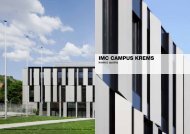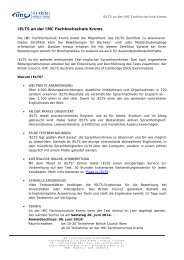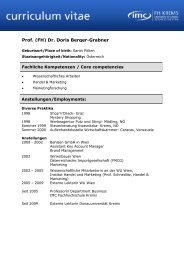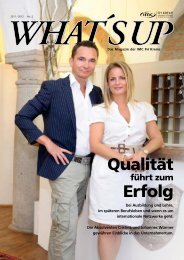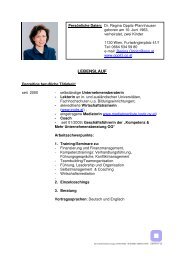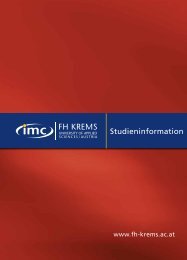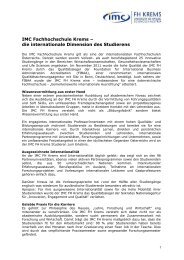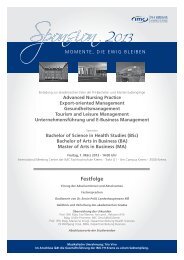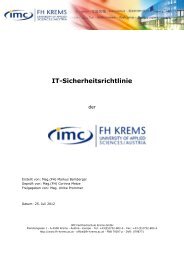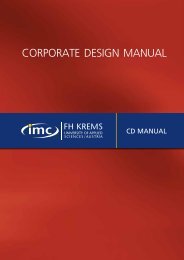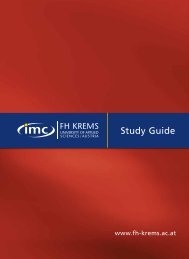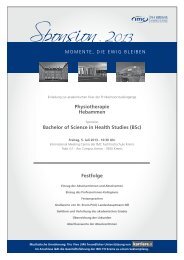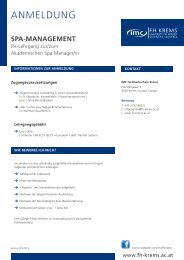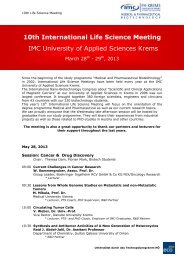International Students' Guide - IMC Fachhochschule Krems
International Students' Guide - IMC Fachhochschule Krems
International Students' Guide - IMC Fachhochschule Krems
You also want an ePaper? Increase the reach of your titles
YUMPU automatically turns print PDFs into web optimized ePapers that Google loves.
experience reports of senior students, all available on the intranet, and counselling during the application<br />
period through info sessions and personal coaching. ERASMUS students act as first-hand information<br />
brokers. Students are supported when setting up their study plans and learning agreements so that<br />
best fit their levels of learning and competences, programme requirements and expected outcomes and<br />
also take into account the culture of the host country. As languages play a key role in all programmes,<br />
students are linguistically well prepared. Recognition of successfully completed studies abroad on the<br />
basis of ECTS is guaranteed.<br />
For incoming students general information and course descriptions are provided in Students’ <strong>Guide</strong>s<br />
and by the staff of the <strong>International</strong> Office. Accommodation Service is given to all incoming students<br />
and special Welcome Days serve as icebreakers upon arrival. The Buddy-system with <strong>IMC</strong> students as<br />
personal tutors to incoming students is a fundamental principle for the integration of incoming students;<br />
tandem language learning helps to promote language competences and cultural understanding. In<br />
addition, a course on Austrian Culture and European Diversity is offered in line with German courses at<br />
four different levels. ECTS is applied for all incoming students. Staff mobility is organised and supported<br />
according to the same quality rules as student mobility; teaching mobility is considered enhancement of<br />
didactic and intercultural competences, an opportunity for critical reflection and exchange of knowledge<br />
and is thus strongly supported through time allowance, funds and acknowledgement.<br />
Placements (internships) are integral parts of all <strong>IMC</strong> curricula, they have to comply with the specific<br />
programme focus and serve as a bridge to the future field of work. The institution provides preparatory<br />
sessions in cooperation with professional recruiters dealing with CV and application design, forms of<br />
interviews, conflict management and personality training. Each programme has a full-time coordinator<br />
to support students in finding placements in accordance with the programme and individual needs,<br />
help with logistic and legal procedures and coach and monitor students during their period of work.<br />
An institutional database provides information on countries, companies and experiences of former<br />
trainees. Quality requirements for placement partners include a targeted “tri-lateral” match of student,<br />
programme and company, a mentoring and monitoring system including a feedback scheme within the<br />
company, access to infrastructure and industry specific know-how.<br />
Job descriptions, working hours, duration of placement, expected learning outcomes, guidance through<br />
the company and services offered are set out in the placement contract signed by the student, the host<br />
institution, the university and in some cases the intermediary organisation. All rights and duties of parties<br />
involved are agreed upon in this contract.<br />
Placements are learning periods, therefore critical reflection on theory learned and implementation of<br />
acquired skills and competences are guiding principles. Monitoring is done in regular intervals to assure<br />
a smooth running, students are in contact with the <strong>IMC</strong> coordinator via email and telephone. Evaluation<br />
of placements by the sending institution is based on students’ reports, presentations and work-related<br />
problem analyses, and complemented by job performance evaluation by the host organisation and<br />
placement supervisor. Placements are recognised as full academic study periods in terms of ECTS by the<br />
university.<br />
FHR-5-0007_Vers.04_Rev.00_August 2012 7



